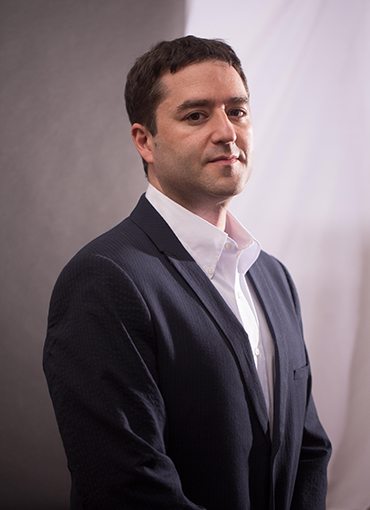Campus News
How mentorship and a transformative graduate experience inspired alumnus Brian Levine to build a legacy of socially responsible innovation
Baskin Engineering’s 2022 distinguished graduate student alumnus Brian Levine credits his time at UC Santa Cruz for giving him the tools to become a life-long educator and socially impactful researcher.

If UC Santa Cruz alumnus Brian Levine (Ph.D. ‘99, computer engineering; M.S. ‘96, computer engineering) had to describe his graduate experience in one or two words, it would be “life changing.”
Coming to UC Santa Cruz immediately after graduating from the University at Albany with a bachelor’s degree in applied mathematics and computer science, Levine had no idea what he wanted to do for the rest of his life—a sentiment commonly shared by many 21 year olds.
An avid interest in computer science and engineering research and the desire to be close to Silicon Valley is what led Levine to move across the country to join the Baskin School of Engineering master’s in computer engineering program. For several years, he worked closely with his faculty mentor J.J. Garcia-Luna-Aceves, distinguished professor of computer science and engineering, to earn a master’s and doctor’s degree in computer engineering. Levine explained that his time at UCSC was pivotal.
“I credit everything to my advisor J.J. He took a chance on me—only 21 years old at the time when I first met him—and for that I am incredibly grateful,” said Levine. “I learned a lifetime’s worth of knowledge from him, and the mentorship and encouragement I received during my time as a graduate student made it an easy decision for me to choose academia over industry.”
Career niche: Academia
When Levine graduated from UCSC, many of his peers were accepting job offers from startups in Silicon Valley. The dotcom era presented exciting opportunities for new graduates to join industry; however, Levine was interested in only one career path.
“My time at UCSC inspired me to become a professor. I wanted to try to make at least a fraction of the same impact that J.J. and all the other Baskin Engineering professors had on me.”
Choosing academia over industry meant Levine could continue his research in peer-to-peer networking, the transferring and sharing of content across platforms, and help students earn an engineering education so they can go on to make a positive impact in society. The humanistic impact of engineering has always been the most important driving factor for Levine’s teaching and research.
Levine joined the University of Massachusetts Amherst (UMass Amherst) in 1999 as an assistant professor of computer science. In 2010, he was elevated to full professor in the Manning College of Information and Computer Sciences. He is the founding director of the UMass Amherst Cybersecurity Institute and co-leads the UMass Amherst Rescue Lab.
Socially responsible, high-impact research
Levine researches the security, privacy, and forensics of computer networks. His recent work has focused on thwarting online child exploitation and other topics, including network privacy, mobile networking, and cryptoeconomics.
Levine has observed repeatedly that while new networking technologies such as peer-to-peer networks and mobile apps bring many benefits, they also surface privacy concerns for children. Noting that children are at a much higher risk for being exploited online, Levine focused on how law enforcement addresses crimes against children, specifically crimes involved in the sharing of child sexual abuse material (CSAM). Recognizing the lack of available tools to identify perpetrators and prevent child exploitation, Levine and his team of Rescue Lab researchers offered their help.
Levine regularly partners with the FBI and the Internet Crimes Against Children (ICAC) Task Force Program to develop tools for network forensics that help in the identification and apprehension of child sexual abuse suspects.
“Revictimization is common for victims of child exploitation, leading to life-long trauma and sometimes worse,” said Levine. “Our goal is to stop the sharing of content and provide justice to the victims of crime. Many times when law enforcement suspects someone of sharing sexually abusive material, they discover the victim within that residence. This area of research is important in finding ways to thwart these crimes from happening.”
The digital forensics tools developed by Levine and his team are used nationally and internationally, aiding in the rescue of hundreds of children from sexually abusive situations. Another area of privacy research Levine is currently investigating is the dangers of social networking apps for teenagers. He is working on scientific observational tools capable of deciphering which apps are the most problematic to help educate families and protect the safety and privacy of teen and pre-teen users.
Honoring a legacy of engineering for good
Levine has published more than 100 papers and is the recipient of numerous awards, including an NSF CAREER Award (2002), UMass Amherst Spotlight Scholar recognition (2016), and the IEEE Infocom Test of Time Award (2017). He became an ACM fellow in 2020 “for contributions to network forensics, security, and privacy, and thwarting crimes against children.”
During Alumni Week, Levine will be honored as the 2022 Baskin School of Engineering Distinguished Graduate Student Alumnus, an annual recognition given to one Baskin School of Engineering graduate student alum who has made major contributions to industry or the fields of teaching and research. Levine will be celebrated for his engineering for social good teaching approach and high-impact research.
“Going to UCSC changed my life, and it feels absolutely amazing to be recognized for my efforts since then,” Levine said.
The Distinguished Graduate Student Alumni Award Ceremony, honoring distinguished graduate student alumni from each academic division, will be held on Saturday, April 23. Register for the event.